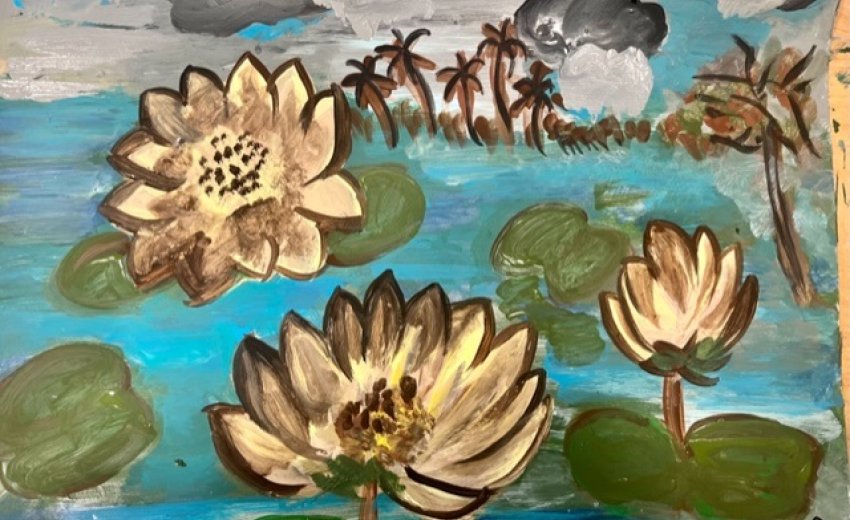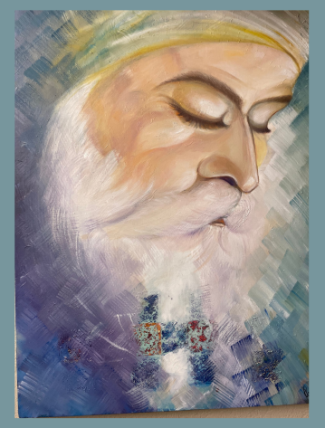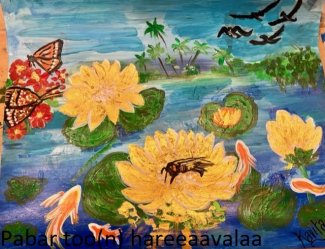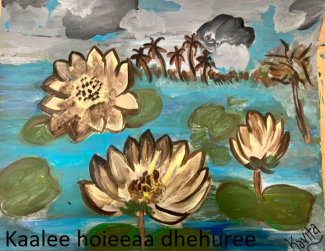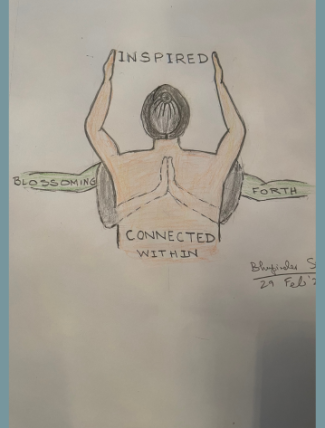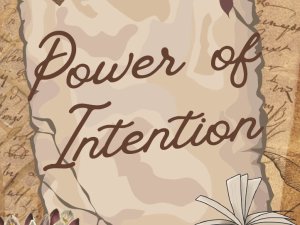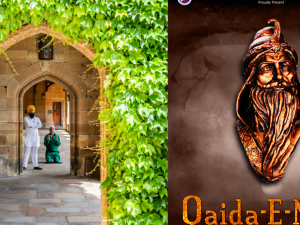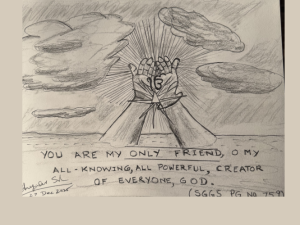Imagine that during one of his long journeys Guru Nanak Dev Ji passed through a beautiful pond, lush green, life giving, full of Fish, birds and insects attracted to the vegetation around it. There is no proper English word to describe it so I will stick to Punjabi word ‘Ramneek’ (= ਰਮਨੀਕ). The pond was nurturing lotuses in it, the surroundings were full of flowers and fruit bearing trees, attracting birds and insects with food and nectar.
But something tragic happened to the pond, the water became fetid and murky, and all the vegetation died, even the fish in the pond did not survive. There were no flowers and fruit left on the trees. Even the bumble bees searching for nectar amongst the lotuses moved away, and the chirping of the birds replaced by silence. A total transformation, the attractive and a beautiful site has lost its allure, ambience has been transformed making it extremely desolate.
Guru Ji happened to be there again, noticing the plight of the pond inquired with the pond about the transformation.
Guru Ji has used the simile of the lotus, but actually he is talking about us. He is trying to tell us that we were designed and destined to glow, be cheerful, full of aliveness, blissful, content, and epitome of divine virtues. What he encounters is a completely different picture – sullen, unhappy, miserable, complaining, and always wanting. Faded looks, gloomy faces, with a total lack of aliveness.
In order to understand the dismal picture as painted by Guru Ji, let us try to understand Guru Ji’s words.
Guru Ji’s Words Picture
ਪਬਰ ਤੂੰ ਹਰੀਆਵਲਾ ਕਵਲਾ ਕੰਚਨ ਵੰਨਿ ॥
ਕੈ ਦੋਖੜੈ ਸੜਿਓਹਿ ਕਾਲੀ ਹੋਈਆ ਦੇਹੁਰੀ ਨਾਨਕ ਮੈ ਤਨਿ ਭੰਗੁ ॥
ਜਾਣਾ ਪਾਣੀ ਨਾ ਲਹਾਂ ਜੈ ਸੇਤੀ ਮੇਰਾ ਸੰਗੁ ॥
ਜਿਤੁ ਡਿਠੈ ਤਨੁ ਪਰਫੁੜੈ ਚੜੈ ਚਵਗਣਿ ਵੰਨੁ ॥੩੦॥
Transliteration:
Pabar too(n) hareeaavalaa kavalaa ka(n)chan va(n)n.
Kai dhokhaRai saRioh kaalee hoieeaa dhehuree naanak mai tan bha(n)g.
Jaanaa paanee naa lahaa(n) jai setee meraa sa(n)g.
Jit ddiThai tan parafuRai chaRai chavagan va(n)n. 30. (SGGS, Pg. No. 1412)
Translation:
O pond! Your leaves (lotus + surroundings) were (lush) green, and your (lotus) blossoms were gold (hued).
What pain has burnt you, and made your (beautiful) body black? (Pond’s response) O Nanak, my body is battered.
(As) I have not received that (fresh) water which I love (and was my constant companion).
Seeing it, my body blossomed forth, and I was blessed with a deep and four-fold beautiful color. ||30||
Key Words from First Line:
Gurmukhi Word- Transliteration – Translation - Symbolizes
ਪਬਰ – Pabar – Pond full of lotuses - Glowing, nurturing, blossoming
ਹਰੀਆਵਲਾ - Hareeaavalaa - Green - Aliveness
ਕਵਲਾ - Kavalaa - Lotus - Beauty, rising above the mud and pond water
ਕੰਚਨ - Kanchan - Golden - Golden Divine Virtues/Qualities of Naam
ਵੰਨਿ - Va(n)n - Colored - Glow
Guru Ji’s Question
Guru Ji used the simile of a pond, which was full of golden hued lotuses and lush green vegetation within and around it. Guru Ji was wondering about the transformation of a pond. Guru Ji asked the pond what happened to it? Earlier you were green (meaning full of zest) with aliveness, radiating divine virtues. Even your body which had a golden glow like with the golden virtues is looking pale and faded. What tragedy has caused you to become so rotten, and your body blackened? Let us see what the pond’s reply was.
Pond’s Response:
The pond replied back saying that I know the cause. The freshwater inflow, which was my companion, I have not received. I have been cut-off from that inflow. Just the sight of that water used to make my body blossom forth four-fold. Now without the freshwater inflow my body has become pale, and my beauty diminished.
Guru Ji was talking about us in this conversation. We were designed to blossom with divine virtues. We were to be helpful in nurturing towards others including species, instead we have become a spent force. The life’s focus is I and me, my needs and identity. That is my ego, which defines me as the sum total of what I have, what I do, and my social status. Attachment with possessions and disconnection from the Source causes this energy depletion. The transformation that has taken place in the body has been explained by Guru Ji Amardas as:
ਕਾਇਆ ਕਮਲੁ ਹੈ ਕੁਮਲਾਣਾ ॥
“Kaiaa kamal hai kumalaanaa.” (SGGS, Pg. No. 1051)
Translation: The lotus like human body is withering away.
The Naam, Amrit is within the body, but as we do not have any connection with it, withering away of the body is an expected natural phenomenon. Naam was going to charge our bodies to make them glow, glitter like gold and make us fully alive like plant greenery and we could be tasting Amrit within. But it is not happening, there is an inner quest for it. We are trying to fill the quest with material possessions, but the empty feeling persists. If the influence on the self is missing, how could we expect to have an influence over others? This is what Guru Ji has termed as the charred body. Our inner being realizes that something is amiss, and it is constantly searching for fulfillment. Guru Ji has described that yearning in these words:
ਮਾਧਉ ਜਲ ਕੀ ਪਿਆਸ ਨ ਜਾਇ ॥ ਜਲ ਮਹਿ ਅਗਨਿ ਉਠੀ ਅਧਿਕਾਇ ॥੧॥ ਰਹਾਉ ॥
“Maadhau jal kee piaas na jai. Jal meh agan uThee adhikai. 1. Rahaau.” (SGGS, Pg. No. 323)
Translation: O Lord, my thirst for the water of Your Naam will not go away. The fire of my thirst burns even more brightly in the water. 1. Pause.
Our thirst is for Naam, but unknowingly we chase the material world, in hopes of quenching that thirst. When the thirst is for water, it cannot be quenched with anything else – wealth, possessions, achievements etc. The net result is we feel empty, spent, depleted, and devoid of energy. In this conversation which Guru Ji has penned, the pond is symbolic of the human body and the lotuses in it symbolizes divine virtues within. The water of the pond is symbolic of Amrit, the ambrosial nectar. When the fresh inflow or connection was blocked, deterioration was bound to take place. Amrit of the Creator is in us, but it is being abused by our five sense organs. When we fail to connect with it which results in body weakness, feeling tiredness, exhaustion. The frustrations of unfulfilled desires, hopes, aspirations only multiply further adding frustrations, making us short tempered and angry. Guru Ji has identified the cause of this sad state in these words:
ਮਨਮੁਖ ਅੰਦਰੁ ਨ ਭਾਲਨੀ ਮੁਠੇ ਅਹੰਮਤੇ ॥
ਚਾਰੇ ਕੁੰਡਾਂ ਭਵਿ ਥਕੇ ਅੰਦਰਿ ਤਿਖ ਤਤੇ ॥
“Munmukh andhar na bhaalanee muThe aha(n)matae.
Chaare kunddaa(n) bhav thake a(n)dhar tikhh tatae.” (SGGS, Pg. No. 1093)
Translation: The self-willed munmukhs do not search within their own selves; they are deluded by their egotistical pride.
Wandering in (all) four directions, they grow weary, tormented by the (unfulfilled) burning desires within.
The birth of desires is always complemented with the birth of anxiety, and doubts about their fulfillment. Guru Ji has shared the relationship in these words:
ਜਬ ਆਸਾ ਅੰਦੇਸਾ ਤਬ ਹੀ ਕਿਉ ਕਰਿ ਏਕੁ ਕਹੈ ॥
“Jab assa anndesa ṯub hee kio kar ek kahai.” (SGGS, Pg. No. 877)Translation: As long as there is hope, there is anxiety; so how can anyone speak of the One Lord?
Guru Ji is pointing to the root cause of tragedy, the outwards search. We are chasing the material world in hopes that it will provide not just us for our needs but also fulfillment, security, fame, and status. But fulfillment is ever uncertain, however when successful it only adds layers of pride in us. The very nature of the material world is to merely fuel more desires instead of providing satisfaction. Acquisition of material wealth only pumps up the ego, making us short tempered, plus anger also grows within. It is for this reason the term ‘deluded’ has been used by Guru Ji. It makes the person becomes more egocentric, who cannot take no for an answer, and who lacks patience. Guru Ji has clarified that all the desires of only very few are ever fulfilled:
ਤ੍ਰਿਸਨਾ ਬਿਰਲੇ ਹੀ ਕੀ ਬੁਝੀ ਹੇ ॥੧॥ ਰਹਾਉ ॥
“Tirasanaa birale hee kee bujhee he. 1. Rahaau.” (SGGS, Pg. No. 213)
Translation: The thirst of (desires) only a few is quenched. ||1||Pause||
Just as the lotus was alive and nurtured in a pond with freshwater circulation, same way the human being will be alive and glowing with Amrit when we connect with Naam on the daily basis. Where is the disconnection? It is in only being interested in the worldly possessions with no interest in the Amrit or the Naam. We are not in the element that we were designed for. That is where Guru Ji wants us to change our approach. Guru Ji wants to transform us from the desolation of empty feelings to a feeling of fulfillment and success. Guru Ji says you came to the world to drink the nectar in these words:
ਜਿਸੁ ਜਲ ਨਿਧਿ ਕਾਰਣਿ ਤੁਮ ਜਗਿ ਆਏ ਸੋ ਅੰਮ੍ਰਿਤੁ ਗੁਰ ਪਾਹੀ ਜੀਉ ॥
“Jis jal nidh kaaran tum jug aae so amrit gur paahee jeeau.: (SGGS, Pg. No. 598)
Translation: The treasure of the Naam, for which you have come into the world - that Ambrosial Nectar is with the Guru.
With that Naam, the golden glow along with green of aliveness will be reflected in our lives. The human body like the water body of pond will be charged, glowing, glittering, serving from the powerful connection. Guru Ji wants us to make that connection, which will make us alive on drinking the ambrosia. It is only with grace that this can happen, then words coming out of the mouth will be:
ਮੇਰਾ ਘਰੁ ਬਨਿਆ ਬਨੁ ਤਾਲੁ ਬਨਿਆ ਪ੍ਰਭ ਪਰਸੇ ਹਰਿ ਰਾਇਆ ਰਾਮ ॥
“Meraa ghar baniaa bun taal buniaa prabh parase har raiaa raam.” (SGGS, Pg. No. 781)
Translation: My (body) home is made, (replete with) the (dense) forest (full of greenery) and pond are made, when I touched the feet of Sovereign Lord God.
The feet here represent the Amrit Naam. Let us also try to construct a home within our body, which is as serene as per Guru Ji’s description. Guru Ji has portrayed a picture of our lives to point out unsatisfying qualities of the material world and how they wreak havoc in our lives. The Creator’s intrinsic design for us is to be alive and glowing in divine virtues. Guru Ji is trying to tell us to overcome that unsatisfying nature of the material world, and instead get inspired to see and connect with something worthwhile and everlasting. Let us make this journey and make our lives blossom forth. Guru Ji has provided us with the guidance of the role models in these words so that we can get inspired:
ਜਿਨ ਡਿਠਿਆ ਮਨੁ ਰਹਸੀਐ ਕਿਉ ਪਾਈਐ ਤਿਨ੍ਹ੍ਹ ਸੰਗੁ ਜੀਉ ॥
ਸੰਤ ਸਜਨ ਮਨ ਮਿਤ੍ਰ ਸੇ ਲਾਇਨਿ ਪ੍ਰਭ ਸਿਉ ਰੰਗੁ ਜੀਉ ॥
“Jin ddiThiaa mun rahaseeaai kiau paieeaai tin(h) su(n)g jeeau.
Sant sajjan mun mitr sae laain prabh siau ru(n)g jeeau.” (SGGS, Pg. No. 760)
Translation: Gazing upon them, my mind is enraptured. How can I join them and be with them?
They are Saints and friends, good friends of my mind, who inspire me and help me tune in to God's Love.
May we be inspired, get connected within and blossom forth.
Acknowledgement for Artwork:
- Kavita Tarneja for 2 paintings of lotus filled ponds.
- Paramjeet Kaur Bhui for painting of Guru Nanak.
References:
